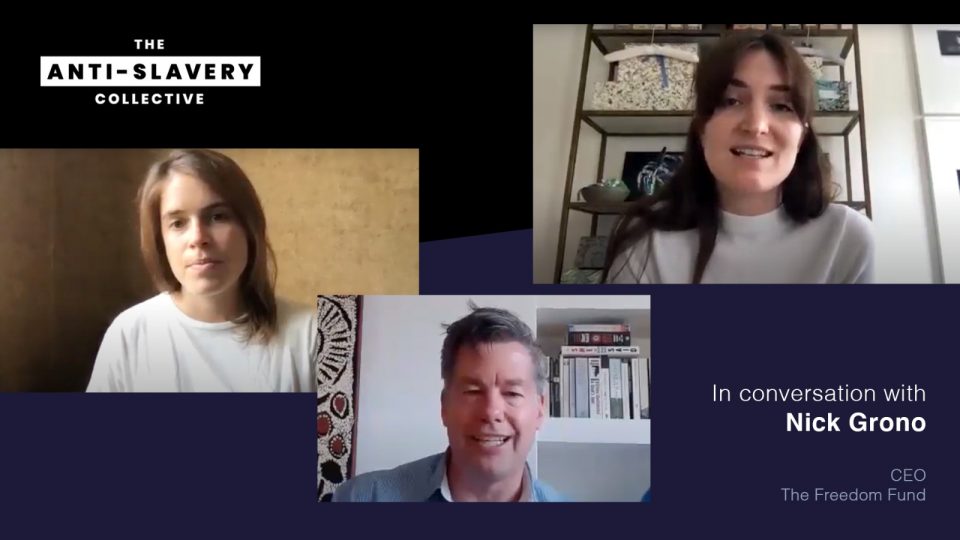While we stay at home and work from home, our co-founders, HRH Princess Eugenie of York and Julia de Boinville, have been finding out how COVID-19 has affected the anti-slavery movement.
Today, we are joined by our friend Nick Grono, the CEO of the Freedom Fund.
The Freedom Fund, using a “hotspot” funding model, work with frontline organisations in the areas of the world where slavery is most prevalent. Nick explains how the pandemic has increased the immediate and long-term vulnerability to exploitation, trafficking and slavery of these already extremely vulnerable populations.
Although the vast scale of the problem can be daunting, Nick believes that we can all make a difference. Whether this is using your consumer power to put pressure on brands or donating a small amount, meaningful progress can be achieved in even the smallest action.
“The most effective way to tackle this approaching tsunami of infection and consequent exploitation is to invest in frontline community organisations.”
Nick Grono, Thomson Reuters Foundation
Nick and the Freedom Fund are passionate about the power and importance of frontline organisations. They are quick to respond, highly resourceful, trusted and influential in communities and low cost. The smallest grant invested in them goes a long way.
Effects of COVID-19 on vulnerable communities
In the immediate effect, lockdowns around the world have displaced millions of migrant workers. Having lost their jobs and shelter, they have been forced to undertake long and dangerous journeys home. On these journeys, they are easy prey to traffickers. Traffickers will not be stopped by lockdowns and border closures; these criminal organisations will go further underground. At the same time, in places like India where there is a very strict lockdown, police efforts are no longer focused on stopping modern slavery, but on keeping people at home.
In the long-term, once the lockdown is over, it is expected that there will be a rise in modern slavery. Desperate people will be more easily exploited by deceptive recruiters and traffickers. In particular, there will be a rise in debt bondage, as millions without incomes or savings will have taken out loans to try to weather the lockdown.
Read more about the effects of the lockdown on modern slavery in India: ‘No work, new debt: virus creates perfect storm for slavery in India‘
What can you do?
Donate to the Freedom Fund’s COVID-19 Emergency Response Fund. All of your donation will provide immediate, small grants directly to some 100 organisations working with vulnerable communities in India, Nepal, Myanmar, Ethiopia, Thailand and Brazil. Many of their frontline partners have obtained government passes allowing them to travel and provide emergency assistance to the most vulnerable communities. These organisations are in urgent need of additional financial support.
Be interested activists and responsible consumers. Join campaigns like Fashion Revolution. Ask clothing companies, who source their products from these hugely affected countries, how they are protecting their most vulnerable workers in their supply chains. Read more about how the pandemic has caused a crisis for workers in the fashion supply chains in our recent blog posts.
Read more about what you can do in our recent post, ‘6 ways you can fight modern slavery from home.‘
The Freedom Fund
The Freedom Fund is the world’s first private donor fund dedicated to ending modern slavery. It identifies and invests in the most effective frontline efforts to eradicate modern slavery in the countries and sectors where it is most prevalent. Partnering with visionary investors, governments, anti-slavery organisations and those at risk of exploitation, they tackle the systems that allow slavery to persist and thrive. Working together, they protect vulnerable populations, liberate and reintegrate those enslaved and prosecute those responsible.
Go to the Freedom Fund’s website to find out more.
Northern India hotspot
We ask Nick about what is happening in their Northern India hotspot. Last year, The Anti-Slavery Collective visited Jaipur to see how the Freedom Fund’s initiative, Child Labour Free Jaipur, is tackling the pervasive use of child labour through a holistic, united approach. They work closely with communities, industries, state government and law enforcement to eradicate the widespread trafficking and exploitation of children.
Nick mentions the difficulties facing one of their amazing frontline partners, TAABAR. TAABAR is an NGO that provides shelter and community-based rehabilitation for boys rescued from labour workshops. The shelter aims to rehabilitate them, re-build their confidence, teach them basic English, Maths and HIndi and find their families.
FOR FREEDOM T-Shirt
Princess Eugenie is wearing her FOR FREEDOM t-shirt from Beulah. 100% of the proceeds from this t-shirt, launched in support of Anti-Slavery Day 2019, go to anti-trafficking charity Justice and Care. Fighting slavery in the UK, Europe and Asia, Justice and Care work to protect the most vulnerable individuals and communities, partnering with police to rescue victims, bring those responsible to justice, restore lives and spark systemic change. Each t-shirt will provide essential supplies for a UK victim.
With an ethical and fully traceable supply chain, this t-shirt is made from a blend of organic cotton and sustainable wood fibres, using an eco-responsible production process. The embroidery and garment finishing processes have provided a fair wage to migrant working women in one of London’s poorest boroughs and the funds raised by each t-shirt will provide essential supplies for a UK victim.
Beulah is a fashion brand that is also a force to fight slavery. They exist to empower vulnerable and previously trafficked women to become economically independent and break free from cycles of exploitation and poverty. Their alternative business model – the ‘Freedom Model’ – is a virtuous circle built to enable the women in their supply chain to gain sustainable employment by incorporating traditional crafts techniques, such as hand-weaving and embroidery.
